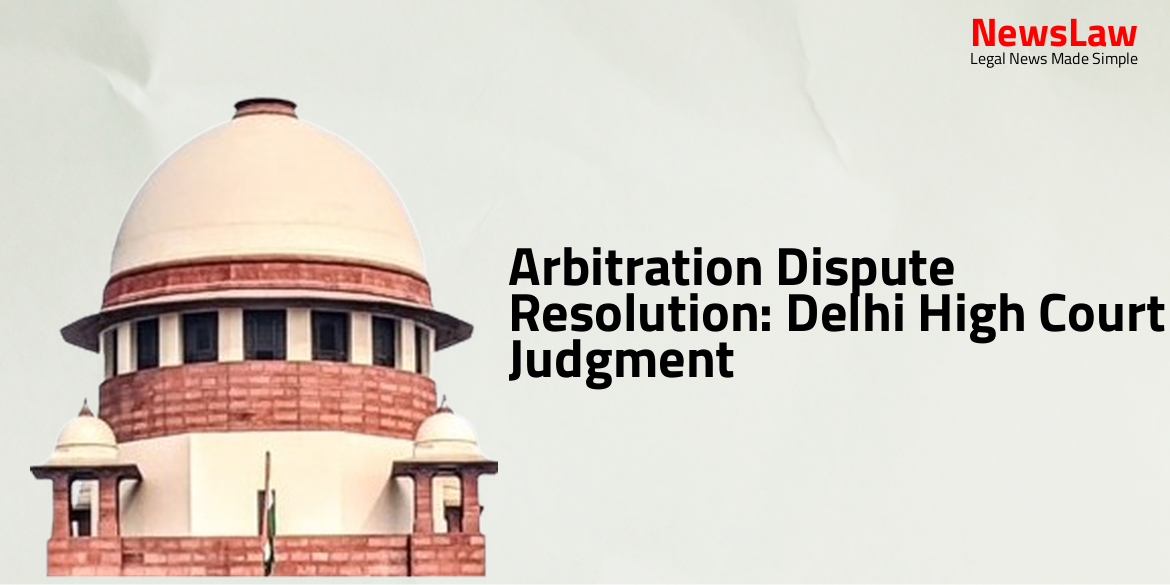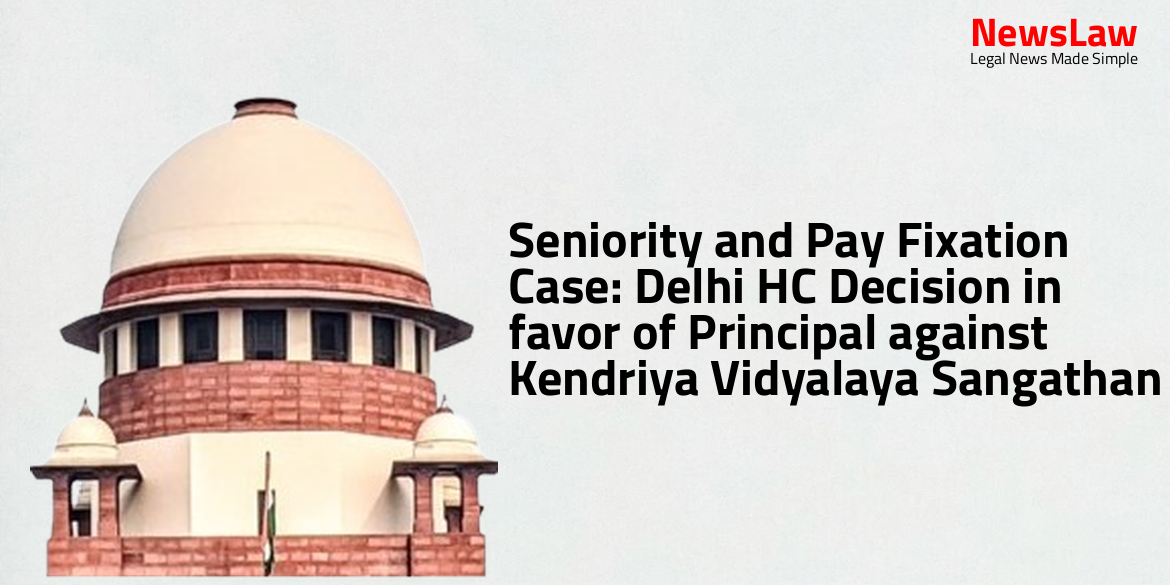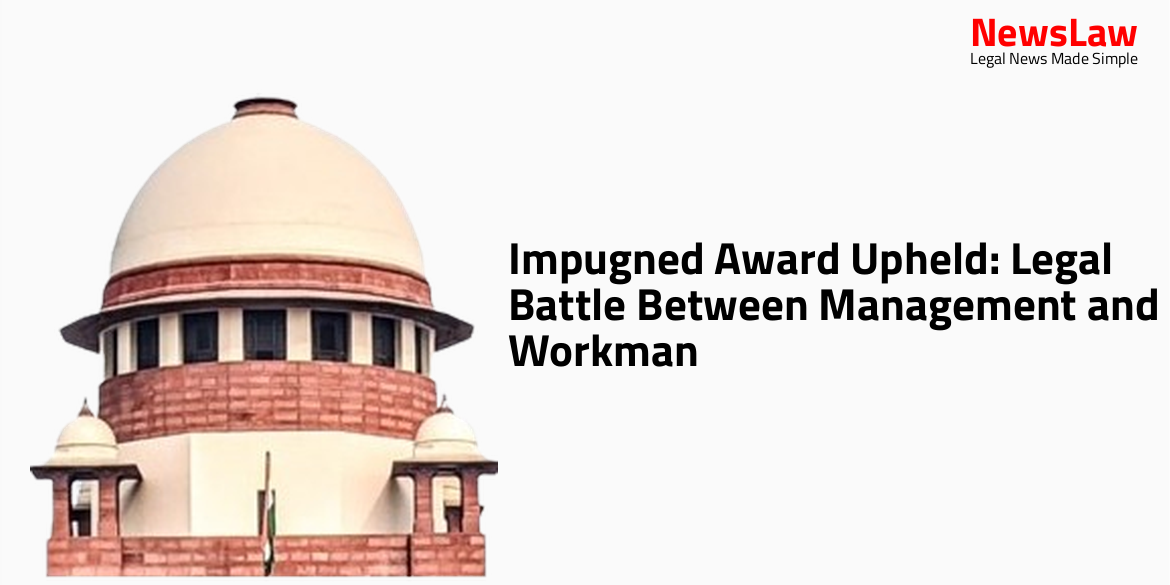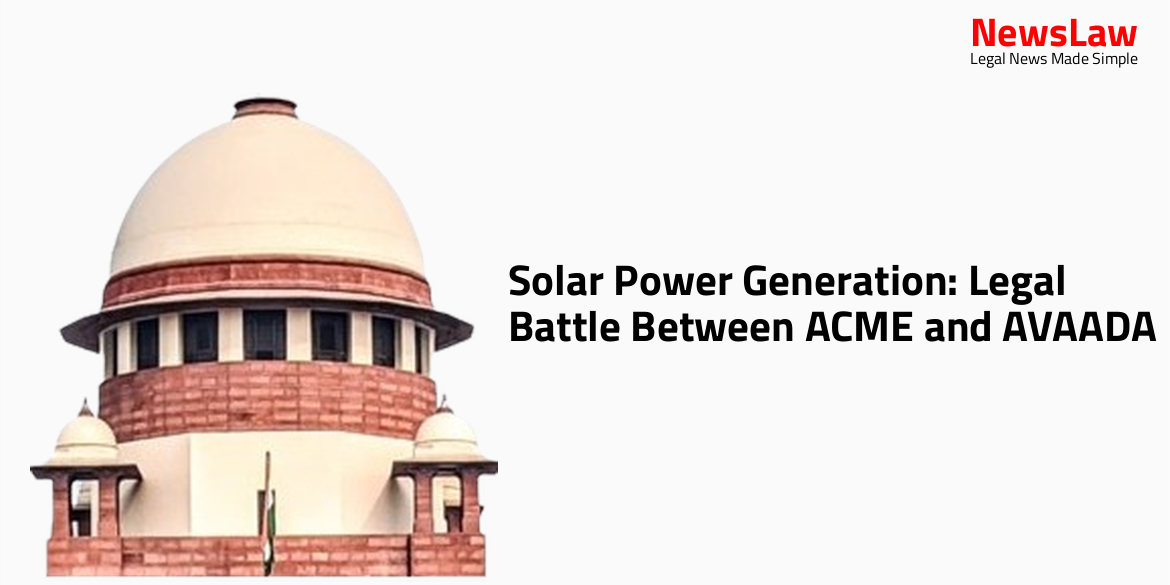Exploring the recent Delhi High Court judgment in the arbitration dispute resolution case, shedding light on the complexities of the legal process. Dive into the details of the case involving negotiations and settlement talks between the parties. Stay informed about the intricacies of the law and the arbitration proceedings.
Facts
- The petitioner attempted to resolve the dispute amicably through a virtual meeting on 06.01.2021.
- The respondent was reminded of the obligation to pay the minimum guaranteed amount until the end of the Lock-In-Period.
- A proper reply to the legal notice was sent by the respondent on 10.09.2020.
- The termination notice dated 18.02.2020 was withdrawn by the respondent on 23.06.2020.
- Negotiations for settlement between the parties led to several discussions and ultimately a settlement.
- The respondent terminated the agreement in violation of Clause 7, leading to the petitioner seeking appointment of a sole arbitrator.
- The respondent issued a notice of termination in advance on 18.02.2020, which the petitioner contested.
- A notice under Section 21 of the Arbitration & Conciliation Act, 1996, proposing an arbitrator was rejected by the respondent.
- Subsequent attempts to appoint an arbitrator and settle the dispute were unsuccessful.
- The respondent claimed the January 2024 notice of invocation was time-barred as the last payment was received in February 2020.
- Settlement negotiations continued with counter offers and concessions made by both parties.
- Legal notices and invocation of arbitration were exchanged between the parties.
Arguments
- In a petition for appointment of an Arbitrator, the Court has to consider whether the claims made in arbitration are barred by limitation and whether the application under Section 21 of the Arbitration Act, 1996 is barred by limitation.
- The distinction between claims being barred by time and the application for referral of disputes to Arbitration itself being barred by time was explained in the cases of Union of India vs. M/s L.K. Ahuja and Co. and J.C. Budhraja vs. Chairman, Orissa Mining Corporation Ltd.
- There is no specific limitation provided for filing an application for Arbitration under Section 11 of the Act after the Notice of Invocation is given.
- The petitioner argues that the claims are not barred by limitation and the petition under Section 11 is maintainable as negotiations for settlement were ongoing and the cause of action arose in March 2021.
- The petitioner relies on the case of Geo Miller And Company Private Limited vs. Chairman, Rajasthan Vidyut Utpadan Nigam Limited, stating that time consumed in genuine negotiations for settlement is to be excluded.
- The petitioner also refers to the Judgment of In Re: Cognizance for Extension of Limitation Suo Motu Writ Petition (C) 3/2020, which excludes the period from 15.03.2020 till 20.02.2022 in computing the period prescribed under the Arbitration and Conciliation Act,1996 due to the Covid period.
- The respondent’s sole objection is that the present petition is barred by limitation.
Analysis
- Differences arose between the parties after last payment received in February 2020
- Respondent served termination notice in February 2020, but later withdrew it in June 2020
- Contract between parties continued after withdrawal of termination notice
- Email exchanges for settlement occurred between February to June 2020
- Legal Notice sent on behalf of petitioner in July 2020
- Notice of Invocation under Section 21 of the Arbitration Act sent in November 2020
- Negotiations talks between parties continued until March 2021
- The judgment relied upon by the plaintiff does not support the petitioner’s claim for exclusion of the COVID period from March 2020 to 20.02.2022.
- The extension referred to by the petitioner applies to Section 23(4) and 29A specifically, not to the petition under Section 11 of the Arbitration and Conciliation Act.
- The negotiation history between the parties must be specifically pleaded and placed on record in cases like these.
- The period from February 2020 to March 2021 is liable to be excluded to determine when the cause of action accrued.
- The date when the cause of action arises for the purpose of limitation should be considered the breaking point.
- Negotiation talks occurred between February and July 2020, and then again from January to March 2021, indicating sincere efforts by both parties to settle disputes.
- The limitation period does not start as long as parties are engaged in dialogue, even if differences arise during arbitration.
- Correspondences show that the parties were attempting to settle disputes through negotiations.
- An interpretation otherwise would force parties into litigation/arbitration prematurely even when there is a genuine hope of resolving issues through mutual efforts.
- The Court must carefully examine the entire history to determine the breaking point where parties would realistically abandon settlement efforts and consider arbitration.
- The right to apply for arbitration only accrues on the date of the last correspondence between the parties, and the limitation period starts from the date of the last communication.
- Claims of the petitioner are not barred by limitation as per the date of invocation
- Second notice of invocation dated 31.01.2024 is within the period of limitation
- Termination notice was withdrawn by the respondent indicating a subsisting contract between the parties
- Limitation is not to be calculated from the first notice of invocation as parties engaged in negotiation talks thereafter
- The second notice of invocation in January 2024 is considered as the relevant Arbitration point for limitation purposes
Decision
- Mr. J.P. Sengh, Senior Advocate appointed as the Arbitrator.
- Arbitral disputes raised with a valid Arbitration Clause between the parties.
- The fees of the Arbitrator to be fixed according to Delhi International Arbitration Centre Rules.
- Arbitrator to make necessary disclosures as per Section 12(1) of the Act.
- Parties have the right to raise objections before the Arbitrator.
- Arbitration to be conducted under Delhi International Arbitration Centre, Delhi High Court.
Case Title: BLOOMING ORCHID Vs. FP LIFE EDUCATION FOUNDATION (2024:DHC:4151)
Case Number: ARB.P.-630/2024



